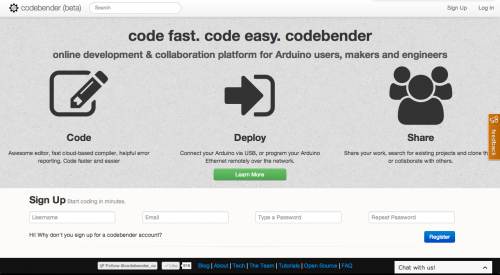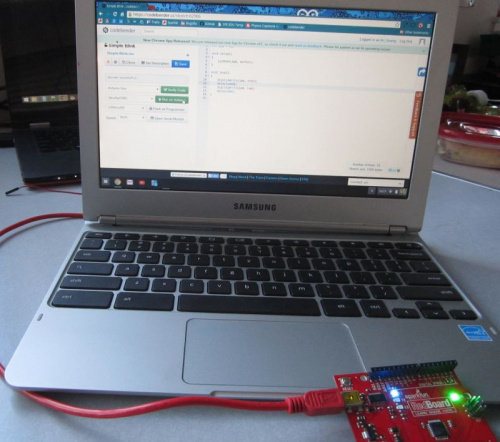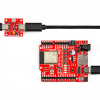Where EdTech meets TechEd
With over 5 Million units sold in the past year, Chromebooks have been a growing trend among schools, homes, and small businesses. With the power of web-enabled tools (google docs), cloud-based storage, and fast internet connectivity, we are starting to see Chromebooks everywhere.
Many schools and school districts have been deploying tens of thousands of Chromebooks district-wide in 1:1 initiatives to get computing and technology into the classroom. The days of a single computer in a classroom or a shared computer lab for the entire school are long gone. The EdTech departments of more and more schools are pushing to have devices like a Chromebook or iPad for every child in the classroom.
In my experience, I've found that Chromebooks are amazing. They have a fantastic battery life, quick boot-up time, and an entire suite of apps and tools -- not to mention they are thin and extremely lightweight. However, for the Maker / Tech Ed / Electronics Enthusiast, one of the biggest drawbacks to Chromebooks has been the inability to connect it to any hardware (i.e. Arduino) -- until now.
Codebender + Chromebook
The folks at codebender just released the codebender plug-in for Chromium OS / Chromebooks. If you've never heard of codebender, it is a cloud-based Arduino IDE. They handle all of the drivers, libraries, and updates on their end so that you don't have to worry about it. Simply write your code, click upload and you're done!
A while back, we posted a short overview of alternatives to the standard Arduino IDE. Codebender was at the top of that list.
This has been a big gap in what we have been able to do with Chromebooks. With this latest release, you can now program any Arduino device through codebender's awesome web interface on your chromebook.
I just happen to have a chromebooks sitting around here in the office, so I decided to give it a try. Before I was able to install the plugin, I did have to update the operating system on my machine first. The full update took about 5 minutes to complete, but after the update was complete, codebender prompted me to install the plugin for Chrome, and that was it!
Click here for instructions for your browser plug-in.
This is amazing! Now, any of the Arduino sketches that I've been programming on my fancy laptop machine can now be done with this Chromebook! This is going to be a big game changer for a lot of schools and individuals with Chromebooks!
Give it a try!
Here's a quick "Hello World!" blink sketch for you to try on your Arduino. If the plugin is installed and you have connected your arduino device to your Chromebook, you should see your COM port appear as something like /dev/ttyUSB#.
Let us know what you think. If you are one of the millions of chromebook owners, give it shot. Let the team at codebender know if you have any issues or problems at feedback.codebender.cc.









Alas Codebender.cc is shutting down operations as of November 2016 https://codebender.cc/next-chapter
I personally love my Surface Pro 3 for all my electronics work. I can do everything I need, even when on the go.
This is great! I used to own a chromebook years ago, embedded electronics was one of the main reasons I never used it much, preferring my laptop. But the rise in cloud computing is beginning to change things. Eventually if internet ever gets cheap and plentiful, all I'll have is a powered screen that streams 4k from the cloud, imagine having 100 servers computing that render of the clear enclosure lid for your electronics in Photoview 360, instead of hours, you might have your render in minutes.
Of course this could be horrible for young students or aspiring entreprenuers. Pirated copies of most programs will cease to exist, companies stop allowing their software to be downloaded. Leaving behind 30 day trials and student editions with limited abilities as the only way to learn a new program outside of youtube videos, it'll have to do.
This would cause of the rise of Linux to actually happen. People want control of their data and their machines which includes the software. My personal opinion to the entrenched commercial software industry is: "try it". I would love to see a rise in awareness for Linux. I would love to see entrepreneurs create more software for Linux especially for engineering. So your future is not bleak at all. Cloud based apps to me is reminiscent of "vendor lock in" from 20 years ago. When I am in the field at a track with 1000HP cars racing past me while I am trying to fix a light controller the last thing I need to think about is getting on the internet for some stupid app. No thank you.
The link in "The folks at codebender just released the codebender ..." points at the wrong place; to a page on SF's website rather than the root of the remote website.
Thanks @swarren. Fixed the link.
Crouton allows you to run any Linux app natively on the ChromeBook. That way, you don't have to rely on cloud services, which can be beneficial for both uptime and snooping reasons. I have yet to try the Arduino IDE on my ARM ChromeBook, but in principle there's no reason it shouldn't work. EagleCAD might run under qemu-user too, although I imagine it'd be slow.
Yes. Thanks! Crouton and ChrUbuntu are both alternative solutions to this -- but, if you're in a school, it's unlikely that you're going to dual boot or have students boot into an alternative OS for you classroom projects. I ran the Arduino IDE under ChrUbuntu a while back, and it worked like a charm -- installing ChrUbuntu and trying to get teachers / students to do the same seemed like too much. But -- yes, there are other solutions to getting a ChromeBook to run Arduino. Booting it into a more fully featured distro of Linux is one of those ways.
Very shiny indeed! this is also nice for my old Asus netbook with the chrome browser! I think the only limit I see is it doesn't look like it supports the Teensy 2.0/3.0/3.1 yet? Definately going to be keeping an eye on this project!
@jkurleto -- Thank you for the feedback. Yes. Chromeduino also works, and it's been around for a while, but it was a little buggy when we tested it -- especially for use in a widespread classroom setting. It uses AVRChick (ChromeOS version of AVRdude) -- which is pretty slick.
And, if you want to give it a try -- there is a beta release of a blockly version of codebender http://blockly.codebender.cc/ -- it's still missing some real key features like clone/duplicate, but it's a great demonstration of the two working together.
Now you just need EagleCAD for Chrome...
Has anyone tried using Upverter? It appears to work on my chromebook! Maybe that's the solution for teaching some PCB design in the classroom too?
Chromeduino has been out for a while. I tested it out with a school using Chromebooks last year, worked just fine.
Web-based editors are a welcome trend in education, given how locked down computers can be. I look forward to having the ability to upload to devices wirelessly as well, much as Spark does (but hopefully more foolproof in connecting).
Another player, Wyliodrin, has prohibitive payment plans in place, but has worked fine when I've tried it. The use of Blockly makes it more accessible for younger grades.